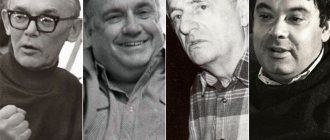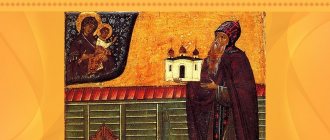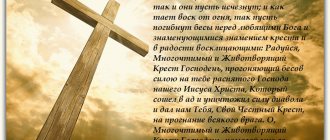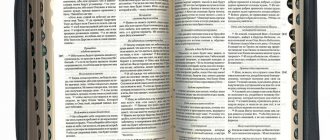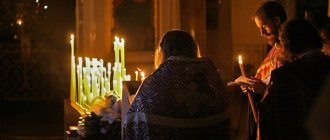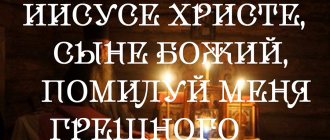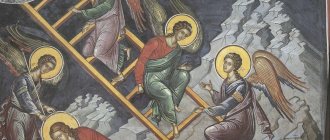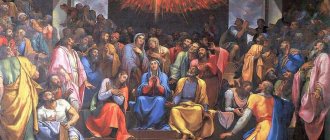| Blessed Augustine. 6th century fresco Lateran Library, Rome |
Augustine of Hippo (
Aurelius Augustine; lat. Aurelius Augustinus Hipponensis; Greek. Αὐγουστίνος Ιππώνος; 354 - 430), philosopher, influential preacher and church politician, blessed (in the Western tradition - saint). He had a huge influence on Western philosophy and theology. Some of the information about Augustine goes back to his autobiographical Confessiones Commemorated June 15
Born in Africa, in the city of Tagaste (now Souk-Aras in Algeria) on November 13, 354.
He owes his initial education to his mother, Christian Monica, an intelligent, noble and pious woman, whose influence on her son, however, was paralyzed by his pagan father. In his youth, Augustine was in the most secular mood and, living in Madaura and Carthage to study classical authors, he completely surrendered to the whirlwind of pleasures.
The thirst for something higher awoke in him only after reading Cicero’s Hortensius. He attacked philosophy, joined the Manichaean sect, to which he remained faithful for about 10 years, but, not finding satisfaction anywhere, he almost fell into despair, and only acquaintance with Platonic and Neoplatonic philosophy, which became accessible to him thanks to the Latin translation, gave him food for a while his mind.
In 383 he went from Africa to Rome, and in 384 to Milan to act here as a teacher of eloquence. Here, thanks to the local bishop Ambrose, he became more familiar with Christianity, and this circumstance in connection with reading the epistles of St. Paul brought about a radical change in his way of thinking and living [1].
On Easter 387, Augustine and his son were baptized by Ambrose. After this, he returned to Africa, having first sold all his property and almost completely distributed it to the poor, spent some time in strict solitude as the head of a spiritual community, and in 391, having entered into the clergy with the rank of presbyter, he took up the activity of a preacher and in 395. was consecrated bishop in Hippo.
| St. Augustine, bishop Ipponian. Mosaic 1148 Cefalu Cathedral, Sicily |
Augustine's influence on the fates and dogmatic side of Christian teaching is almost unparalleled.
He determined the spirit and direction of not only the African, but also the entire Western Church for several centuries to come. His polemics against the Arians, the Priscillians, and especially against the Donatists and other heretical sects clearly demonstrate the extent of his importance. The insight and depth of his mind, the indomitable power of faith and the ardor of imagination are best reflected in his numerous writings, which had incredible influence and determined the anthropological side of the doctrine of Protestantism (Luther and Calvin). Even more important than the development of the doctrine of St. Trinity, his research on man's relationship to divine grace. He considers the essence of Christian teaching to be precisely man’s ability to perceive God’s grace, and this basic position is also reflected in his understanding of other dogmas of faith. In the dispute with the Pelagians, Augustine of Hippo was not a completely true representative of Christian teaching, which, in some respects, is as far from Augustinianism as from Pelagianism (for more details, see Pelagianism). His concerns about the structure of monasticism were expressed in the founding of many monasteries, which, however, were soon destroyed by vandals.
He died on August 28, 430 during the last siege of Hippo.
His short life, Vita Augustini
, was written by his student, Bishop. Possidio Kalamsky (+ 440).
The remains of Augustine were transferred by his followers to Sardinia to save them from the desecration of the Arian Vandals, and when this island fell into the hands of the Saracens, they were redeemed by Liutprand, king of the Lombards, and buried in Pavia, in the church of St. Petra. In 1842, with the consent of the pope, they were again transported to Algeria and preserved there near the monument to Augustine, erected to him on the ruins of Hippo by the French. bishops.
Life
Born into a poor provincial family. His father, Patricius, was a pagan and was baptized only before his death; his mother, a revered Catholic. church of St. Monica is deeply religious. Christian. A. studied rhetoric in Tagaste, Madaure, and from 370 in Carthage, where he became a professional rhetorician (from 374). Reading Cicero prompted him to turn to philosophy. Then he experiences a ten-year fascination with Manichaeism, which attracted him with its assertion of the possibility of rational knowledge of God and dualism. the concept of the eternal confrontation between God and matter as an evil principle (metaphysical and ethical dualism will determine A.’s thought for many years after he breaks with the Manichaeans).
From 383 in Rome, from 384 Master of Rhetoric under the Emperor. courtyard in Mediolana (Milan). Disillusioned with Manichaeism, he shares the skepticism for some time. the philosophy of the representatives of the New Academy (see Academy of Athens), listens to the sermons of Ambrose of Milan and at the same time discovers the works of the Neoplatonists, especially Plotinus and Porphyry (in the Latin translation of Maria Victorina). The Platonist philosopher and Christian presbyter Simplician explains A. the internal kinship of the doctrine of the Logos from the Gospel of John with the doctrine of Plotinus about the Mind, the Christian dogma of the Trinity and the triadology of Porphyry. He also draws A.’s attention to the messages of St. Paul, especially on his doctrine of grace. During these years, A.’s formation as a Christian and thinker was completed. In 387 he was baptized and published the first works known to us.
In 388 A. returns to Tagasta, lives for several years. friends in monastic solitude. In 391, at the insistence of bishop. Valeria was ordained a presbyter; in 396 he became bishop in the city of Hippo Regius (modern Annaba, Algeria). In his work there is a gradual evolution from Plotinus to St. Pavel, from an optimistic point of view. statements of nature. the divinity of the rational human soul to the recognition of the decisive role of the grace of God in the salvation of fallen man. During this period, intensive practical A.’s activities in organizing the church life of the diocese, organizing monastic communities, etc. are combined with forced polemics against teachings that threatened to split his flock. During the first 10 years of his priesthood, A. actively opposed the Manichaeans, and in 400, against the Donatists. In 411, A. presided over a church council in Carthage, where, through his efforts, Donatism was condemned as a heresy. After the victory over the Donatists, Ch. A.'s opponents were the Pelagians, who believed that salvation was the work and merit of man, and not God's grace. Already in 412, and then in 416, councils were held in Carthage against the Pelagians; Pelagius and his follower Celestius, through the efforts of A., were condemned as teachers of heresy, but even after the condemnation, Pelagianism acquired many supporters, so A. continued to publish anti-Pelagian works until 428. A. died during the siege of Hippo by the Vandals.
Birth and childhood
Who would have thought that, having been born into a far from wealthy family, Augustine Aurelius would soon become one of the greatest theologians and philosophers of his time, still known today.
His mother was none other than Saint Monica herself, a pious Christian who made an invaluable contribution to the development of Augustine. His father was a small landowner who professed paganism, which also greatly influenced the formation of the thinker’s consciousness. In his youth, Augustine had no desire for the Greek language, which was considered almost the main subject studied at school. The boy was captivated by Latin literature and was immensely interested in theater. After graduating from school in Tagaste, young Augustine continued his studies in the neighboring cultural center - in Madavra.
Essays
More than 100 works have survived. A., in addition to letters and sermons. The most widely read of them is “Confession” (books 1–13; ca. 400), a kind of spiritual autobiography of A., written with sincerity and psychological depth unprecedented in antiquity and the Middle Ages. analysis, and “On the City of God” (books 1–22; 413–426) – apologetic. work created after the destruction of Rome by the Goths of Alaric in 410. The earliest op. – philosopher treatises in the spirit of Neoplatonism, written in 386–391: “Against the Academicians”, “On Order”, “Monologues”, “On the Quantity of the Soul”, etc. Contained in the treatise “On Music” (books 1–6; 387) the famous The definition “Musica est scientia bene modulandi” (“Music is the science of good singing”) has been repeatedly quoted and interpreted for a thousand years (Cassiodorus, Marcianus Capella, the anonymous treatise “Scolica Enchiriadis”, Aurelian of Reaume, the school of John de Muris, F. Gafuri and others). The most important op. A.: dogmatic - “On the Trinity” (books 1–15; 400–415), “Enchiridion to Lawrence on faith, hope and love” (421), “On 83 different questions” (389–396); exegetical - “On Christian Teaching” (books 1–4; 396–427), “On the Concord of the Evangelists” (books 1–4; 400), two commentaries on book. Genesis, interpretation of the Gospel of John, Psalms and Apostolic Epistles; moral and ascetic - “On abstinence” (394–395), “On patience” (418), “On holy virginity” (400–401), “On the good of widowhood” (414). Of particular interest are his polemics. essays. In the polemic against the Manichaeans [more than 10 works, including: “On Free Decision” (books 1–3; 388–399), “Against Faustus the Manichaean” (books 1–33; 397–398) ] the Augustinian theory of free will takes shape, in the struggle against the Donatists [“On Baptism against the Donatists” (books 1–7; 400)] - ecclesiology and philosophy of history. In disputes against supporters of Pelagius (see Pelagianism), the doctrine of grace and predestination is formulated: “On the baptism of infants” (books 1–3; 411–412), “On the grace of Christ and original sin” (books 1–2; 417 ), “Against Julian” (books 1–4; 421), “On Grace and Free Determination” (426–427), “On the Predestination of the Saints,” and “On the Gift of Perseverance [in Good]” (428–429). In addition, A. wrote against the Arians, Marcionites, and also compiled a set of all 88 heresies known to him and their refutation (“On Heresies,” 428–429). Shortly before his death, A. published 2 books of “Revisions”, in which, summing up everything he had written, he characterized 93 of his works, noting everything that was said in them that was incorrect.
Stages of Augustine's creativity
There are three main periods of the thinker's activity, which reflected the evolution of his views - it is characterized by a gradual shift of emphasis from ancient philosophy to the problems of eschatology, church dogma and defense of the faith.
First
386-395 AD It is distinguished by the strong influence of Neoplatonism and rationalism. Philosophical dialogues come from the pen of Aurelius, and the evidence base for the theory of the seven liberal arts is given. Works on music theory, theological works and a series of works on the criticism of Manichaeism are being written.
Second
395-410 AD The main milestone is the ordination of bishops. Augustine is engaged in biblical studies, composing commentaries on the texts of Scripture, moral treatises and polemics against Donatist heretics. He writes "Confession" - his famous biographical work.
Third
410-430 AD In his declining years, the church father wrote denunciations of Pelagianism and focused on the problems of eschatology and the universe. The treatise “On the City of God”, the main historical and philosophical work, was published.
Teaching
Reason and Faith
St. Augustine. Fragment of the altar fresco by S. Botticelli in the Church of All Saints (Ognisanti) in Florence. 1480. Archive of the “Orthodox Encyclopedia”
The Christian faith for A. is true wisdom, true philosophy. In his early works, A. allows for the possibility of perfect knowledge of God on the path of pure philosophizing: an honest philosopher, moving towards the Truth, will come to faith: “Understand in order to believe” (intellige ut credas). However, this path is only for a very few, gifted with extraordinary purity of heart and strength of mind; most people need an authoritative leader, which they find in Christ. Unlike Platonism, Christianity is a philosophy for everyone. Faith and knowledge are inseparable: “Believe in order to understand” (crede ut intelligas).
Platonism helped A. finally overcome Manichaeism and academicism. skepticism: if, in addition to deceptive appearances, there is a true reality of unchanging intelligible entities, the search for truth makes sense. Sensation deceives, but the very fact of sensation is undoubted, just as it is undeniable that if I am deceived, then I exist (si fallor sum) (“Against the Academicians,” III, 11, 24). The judgments of self-consciousness are reliable: if I doubt everything, then I undoubtedly exist and know that I exist, and I know that I know this (“On the Trinity,” X, 10). The laws of logic and mathematics are unshakably reliable, they are timeless (rationes aeternae); such knowledge cannot be gleaned from experience: in nature there is neither an ideal triangle nor equality. Where do they come from? Rejecting Plato's anamnesis (remembering), which presupposes the pre-existence of the soul, A. proposes the theory of illumination - the enlightenment of the human mind with the light that God himself, the source of being and knowledge, emits, thanks to which the rational part of our soul can contemplate all intelligible entities (“Monologues”, I, 6, 12).
The doctrine of God and knowledge of God
Reason raises us above dumb animals and constitutes the essence of man; but we are also capable of judging our own mind and, therefore, are involved in something that is higher than reason and imparts truth to the judgments of self-consciousness. This “one immutable Truth, containing in itself all the immutable truths available to us... like a light, at once invisible and publicly available, miraculously bestows and reveals itself at once to all who are able to see the immutable truth” (“On Grace and Free Decision,” II, 33) . We cannot judge about it: “What we think about God is truer than what we can say about Him; but what He is is truer than what we can think about Him” (“On the Trinity,” VII, 4, 7). What is comprehensible to us is not God (si comprehendis, non est Deus - “Word”, 117, 3, 5). The only knowledge about God that a soul that has not yet achieved holiness can contain is “to know to what extent it does not know Him” (“On Order,” II, 18, 47); this is “learned ignorance” (docta ignorantia) (“Enchiridion”, 80, 15, 28).
God is the highest Truth and reality, above Him, outside of Him, besides Him there is nothing. The God of the Old Testament reveals himself as pure being: “I am who I am.” Being the cause and source of all being, God is the goal and the highest good for all things. This teaching of A. about God fits perfectly into the framework of Neoplatonicism. metaphysics, although A. seeks evidence of the existence of God and comprehension of the nature of God rather within his own soul than in the structure of the universe. But in the doctrine of the Trinity, A. tries to achieve understanding no longer by the method of negative (apophatic) theology, but by analogy. A creature always bears the mark of its Creator, and a rational soul must in some way be similar to the Creator, and must also bear the “trace of trinity” (vestigia trinitatis). Self-aware thinking is self-relationship: intelligence, self-awareness and self-love form an inseparable trinity. Second analogy: the thinking subject and his thought are one, but every thought is the unity of three moments: memory, understanding and will; these moments cannot merge together, each of them “is what it is through another,” and at the same time they are all “not three lives, but one life, not three minds, but one mind and, therefore, not three beings, but one being” (“On the Trinity”, X, 11.18).
Creation of the world
The world, both physical and spiritual, was freely created by the will of God out of nothing. Despite the fact that the entire Holy Trinity acts unitedly and inseparably, A. also speaks of specific things. the action of each of the three Persons: the Father endows everything with being, the Son with form and wisdom, the Holy Spirit with order, harmony, and grace. Just as with people the word is the revelation of the soul outside, the communication of oneself to another, so with God the Word communicates His otherness, pure nothingness. This Word, “uncreated Wisdom” (sapientia increata - “Confession”, XI, 6, 7) is the universal creative force that creates created likenesses of ideas that are eternally present in the mind of God (“On Various Questions”, 46, 2). Divine ideas are instantly and all at once introduced into formless matter (also created by God from nothing), forming in it potentialities, or seeds (rationes seminales) of all future things that actually arise in a certain time sequence. Having rooted Platonic ideas - eternal models ("paradigms", Latin exemplar; hence this concept of A. received the name exemplarism) of temporary things - in God's mind, A. made possible Christian Platonism, from which all Western origins. theology up to the 13th century. But unlike Plato, for whom only the universal is ideal, A. asserts that God thinks both individual things, and above all human souls. The spiritual world, Plato’s intelligible cosmos, turns from the unity of all intelligible ideas into the kingdom of individual spirits - angels, immaterial beings enjoying eternal bliss near God and possessing direct intuitive knowledge of God and Divine ideas (Confessions, XII, 9, 9). Like all created things, angels exist in time, they are subject to change and are in constant, albeit purely spiritual, movement. At the upper levels of the universal hierarchy are things that were originally created perfect and fully realized: angels, the firmament, earth, sea, air, fire, luminaries and the human immortal soul. Below are individual bodies, not quite real, because their perfection is still in potency. The lower limit of the hierarchy is matter, the place of maximum distance from God; the world is stretched between the upper and lower poles, from absolute existence to non-existence; The closer to matter, the more potentiality, the desire for decay and death in things.
A. understands evil in the world in the spirit of Platonism not as an independent essence or property (as the Manichaeans believed), but as a lack of good and being. In his early writings, A. emphasizes that in order to avoid evil, a person must turn away from the flesh, the physical world, and sensuality; later, the center of his consideration turns out to be the free will of rational beings as the only source of evil in the world, and not only moral: the fall into sin of first the angels, and then man, brought death into the world and changed the entire nature of creation.
Anthropology
The dualism of the human soul and body is rooted in A. in creation itself. Only Adam's soul was created in the first days of creation; the body developed later under the influence of nature. reasons. The soul “is something higher than the body”: the body is created by parents, and the soul by God. Although A. could not finish. the choice between creationism (the soul is created by God and endowed with immortality at the moment of conception) and traductionism (the soul is passed on to the child from the parents), he did not share the Platonists’ view that the body is just the rough clothing of the soul, a shackle or prison in which fallen souls serve their punishment , and insisted on the real substantial unity of man. But it is not possible to consistently substantiate this unity of A.; its anthropology remains contradictory. Man is the image and likeness of God, but the body does not resemble God. The soul is “a rational entity, the purpose of which is to govern the body” (“On the Quantity of the Soul,” XIII, 22), an intermediary between God the spirit and bodily nature. “As God is the life of the soul, so the soul is the life of the body” (“Word”, 273, I, 1). Following Plotinus, A. most often identifies man with the soul: “Man is a rational soul using a mortal and earthly body” (“On the Morals of the Church,” I, 27). The study of the soul is one of the chapters. tasks of his life (“I want to know the soul and God”). The soul is substantial, immaterial and immortal in nature, it reproduces the triadic. structure of the Divine: memoria – intelligentia – voluntas (memory – thinking – will) or mens – ratio – intellectus (soul – reason – mind). The mind as the highest and immortal part of the human soul is the deep core of the individual human being, what is revealed to us in the act of self-consciousness as the essence of our Self.
God created man potentially sinless and immortal: this, according to A., consisted of his small freedom (libertas minor) and small immortality (immortalitas minor). Having abused his freedom, deviating from God in his quest for self-affirmation, man became a slave to sin and death. Christ, by his Incarnation and death on the cross, restored damaged human nature, making possible freedom from sin (greater freedom, libertas maior) and true, greater immortality (immortalitas maior). The body of the resurrection, unlike the present flesh - the source of passions and temptation - will be spiritualized and incorruptible, not interfering with the contemplation of God.
Freedom and Grace
Considering (in the spirit of Platonism) the goal of human life to achieve spiritual perfection through the search for intelligible truth, A. at the same time proceeds from the fact that man cannot achieve this on his own, for his will, corrupted by original sin, has an initial inclination towards evil. A. for the first time thematizes the will as a center. the concept of anthropology, considering it not as an action of volition, inseparable from reason as the ability to see a goal (as with the Platonists), but as the very possibility of volition - the unconditional freedom to want or not to want. Even if the mind indicates an object worthy of desire, a person may not strive for it if he does not want to. It is in such free will that the source of evil in the world is: everything that God created is good, but a person can prefer a lesser and conditional good to a greater and unconditional one. The highest good, God, is the only thing worthy of aspiration and love in itself; everything else is just a means to achieve the main goal. Among these other things, knowledge and virtue are highest (the four cardinal Aristotelian virtues: understanding, courage, temperance, chastity, which together constitute justice, or righteousness, iustitia; and the three theological virtues: faith, hope, love); lowest of all are external goods (health, human affections, wealth, honor, etc.). Making the right choice for our will means observing in love that order (ordo amoris) that corresponds to the hierarchy of values in reality: first of all to love God, for the sake of this love to love our neighbor and last of all ourselves. After the Fall, a person cannot want correctly on his own: with complete freedom of desire, his choice is always determined by self-love. Fallen man “is not good and it is not in his power to become good” (“On Free Decision”, III, 18). All of humanity is a mass of sinners that cannot help but sin. Only God's mercy and grace can turn a person's will to good, although neither the fall nor the action of grace deprives a person of his freedom. God, whose mercy is higher than justice, by his grace freed the wills of some people from the bonds of sin, so that it became possible for them to make the right choice. Thus, the human race is divided by God into those destined for salvation, the chosen (praedestinati, electi), and the rejected (reprobati).
Philosophy of history: “city of earth” and “city of God”
The entire history of mankind is viewed by A. as a confrontation and struggle between two communities: earthly (civitas terrena) and heavenly (civitas caelestis), the state of the devil (civitas diaboli) and God (civitas Dei), the city of the wicked and the city of the righteous. Both cities are invisible, they are “created by two kinds of love: earthly - love for oneself, brought to contempt for God, and heavenly - love for God, brought to contempt for oneself” (“On the City of God”, XIV, 28). Citizens of both communities are not only people. The beginning of world history was laid by the irreversible decision of the angels who fell away from God; History will last until the number of saved human souls equals the number of fallen angels. Center. historical event - the incarnation and death of the Savior on the cross. A. refuses cyclic. the view of history inherent in antiquity, according to which nothing fundamentally new can happen; He also does not share the idea of the infinity of world history, according to which nothing final can happen: “Christ died once for our sins... and we, once resurrected, will forever abide with the Lord” (ibid., XII, 14). The endless pursuit of happiness is the lot of the rejected, whose will is doomed to love earthly things; earthly life is “an oscillation between illusory happiness and genuine misfortune” (ibid., XII, 21). On the contrary, a righteous person, in the midst of the most terrible disasters, will be happy with the hope of future bliss in the Kingdom of God. A. does not identify the “city of God” with the earthly Church (ecclesia), and the community of sinners with the earthly state (res publica). “In the present age these two cities are intertwined and mutually mixed until they are separated at the last judgment” (ibid., XIX, 24). Earthly statehood is neither good nor evil; it is a product of the creativity of people guided by selfishness; from here stem both the advantages and disadvantages of the state as a form of human society based on this-worldly principles. The Earthly Church is not a community of saints, as the Donatists insisted, but a community of those striving for holiness. The Church is holy not because it is composed only of the righteous, but because the Spirit of God is present in it and in its sacraments. The wandering earthly Church will be reunited with the triumphant heavenly Church only at the end of times (“Enchiridion”, 56–61).
Youth
In 370, at the age of 16, thanks to the financial support of one of the richest residents of Tagaste, Augustine went to study rhetoric in the glorious city that played a significant role in the development of Augustine as a philosopher - Carthage.
Initially, in Carthage, the study of sciences faded into the background for Augustine. Imbued with the spirit of the cultural metropolis, Augustine went to the theater, visited churches and, of course, made acquaintances with girls. We can say that during this period Augustine led a rather dissolute lifestyle - forgetting about his main purpose of being in Carthage, he indulged in carnal pleasures, frivolously throwing himself into the arms of young beauties. Augustine himself, in a more mature age, will evaluate his behavior in his youth with all Christian severity, sincerely repenting and reproaching himself for carelessness.
At the age of 17, Augustine became a father for the first time. An unknown girl, with whom he subsequently lived in a civil marriage for 13 years, bore him a son, who was named Adeodate (Given by God - A Deo Datus).
A year after the birth of his son, Augustine becomes acquainted with the work of the great Cicero called “Hortensius”. This work awakens in him a craving for spirituality. From that time on, philosophy became his passion, and a little later the Bible was added to his hobbies.
However, despite the constant study of the holy book, Augustine soon joined the then popular religious movement - Manichaeism (a pseudo-religion that originally united Christian-Gnostic ideas about the world, Buddhism and Zoroastrianism). Around this time, Aurelius began teaching rhetoric in Tagaste and Carthage. He actively promotes Manichaeism, studies Manichaean writings, and encourages his friends and acquaintances to join this religion.
Influence
The doctrine created by A. became a model for Western thinkers for a thousand years (see Augustinianism), defining Platonism. orientation of early scholasticism. Up until Thomas Aquinas, Aquinas was an indisputable authority in matters of theology and philosophy, and Catholic representatives still appeal to Aquinas. neo-scholastics, not satisfied with the rationality of Thomism. The founders of Protestantism, M. Luther (an Augustinian monk) in his concept of faith and grace, and J. Calvin in the doctrine of predestination were inspired by A.'s ideas. Characteristic for A. is an appeal to the immediate. personal experience, internal the experience received a wide response in new Europe. philosophy (from B. Pascal to religious existentialism).
Veneration of the Blessed
Saint Augustine was canonized and revered by both Western and Eastern Christians. It is also recognized by the Lutheran Church.
In Orthodoxy
Orthodox believers venerate this saint among the blessed. The Russian Church celebrates his name day on June 15 (28).
In Catholicism
In the West, the saint is better known and revered - he has the title of Teacher or Doctor of the Church. Aurelius is also one of the group of Fathers, early saints revered by both branches of Christianity. Memorial Day - August 28.

